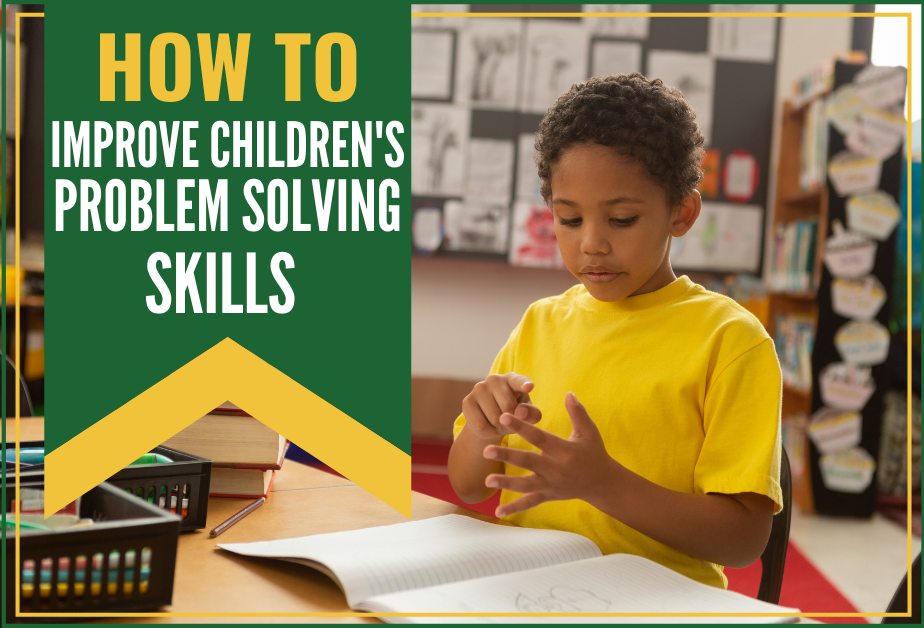How to Improve Children’s Problem Solving Skills
It's no secret that many kids learn best by doing. When children are given tasks to complete and problems to solve, they're forced to think critically and actively engage with the material. These types of activities may present a challenge for some parents who might not feel equipped to help their children improve their problem-solving skills.
Strong problem-solving skills are essential in order to tackle a variety of tasks, including schoolwork and interpersonal relationships. Luckily, there are many things you can do to help kids develop these critical skills. Here are five tips to help you improve your child's problem-solving abilities:
Identify the problem
The first step to solving any problem is recognizing that one exists. Some problems are apparent and present themselves immediately, like a broken bike or a difficult homework assignment. Others may not be as clear, especially to children. We need to help young children learn how to identify a problem on their own. This can be accomplished by using real-life examples. For example, if your child is having trouble in school, discuss ways in which one could identify the source of the problem. Ask children open-ended questions, such as how they spend their day, how they feel about different subjects, and which parts of the school they enjoy or don't like. These types of discussions will help children narrow down the ultimate cause of their struggle.
Brainstorm solutions
Once your child has identified a given problem, it's time to come up with potential solutions. This is an essential step to the process. When kids are given free reign over solving problems, they become better at recognizing their options and figuring out how to put a plan into action.
However, when parents or teachers immediately jump in to offer suggestions or fix things, it can be overwhelming for young children as they try to process all of the information being thrown at them. As you allow your child to brainstorm, try asking open-ended questions about possible approaches or solutions without providing any hints. This should be done one step at a time so as not to overwhelm your child.
Choose the best solution
Once you and your child have come up with a few possible solutions, the next step is to choose the best option. Some kids struggle because they are afraid to make a mistake, or they may not fully understand how multiple options can co-exist. It's important not to rush this step. Give children plenty of time to consider each possibility carefully before pushing them towards a final decision. Be sure to ask specific questions about how they might implement their plan and how it might affect other parts of their lives (such as daily activities or schoolwork).
Parents should also avoid pressuring children into implementing a specific solution. Just because a child comes up with a specific answer does not mean it's the wrong one. In fact, some solutions might be better than others based on the circumstances and people involved. Allow kids to choose how they want to solve their problems and learn how to weigh pros and cons from an early age.
Implement the plan
Once your child has decided on how to proceed, it’s time to put the plan into action. Kids don't have to execute their plan perfectly on the first try. It's important for parents not to stifle children’s creativity or immediately jump in when something seems off track, or if things get complicated along the way. Young children need time and space to find solutions on their own without adults intervening. If you sense that your child is stuck or not sure how to proceed, offer one suggestion at a time, and allow your little one to give it a try. Resist the temptation to judge.. Remember, this is how kids learn how to problem solve!
Record the process
It’s important for parents to remember how difficult it may have been for them when they were young learners. For example, think back at how often you may have needed help with spelling simple words or solving basic math problems before figuring it out on your own. Keeping a record of how children progress with regard to solving problems is a great way to show how much growth they've experienced in developing these essential skills over time. Even though kids might not realize how far they've come, this record will help them see how much they've grown and how capable they really are.
Whether your child is struggling with math equations or is experiencing conflicts with peers at school, kids deal with a variety of problems and challenges daily. Helping them develop and improve their problem-solving skills from an early age can help make it easier for them to tackle issues on their own throughout their lives.
At Mrs. Myers' Learning Lab, we believe that all children can be happy, successful, and confident learners, regardless of their abilities. All students who have enrolled at Mrs. Myers' Learning Lab have shown growth, and many have even shown significant growth, as compared with children who don’t attend our center. Contact us for more information.





